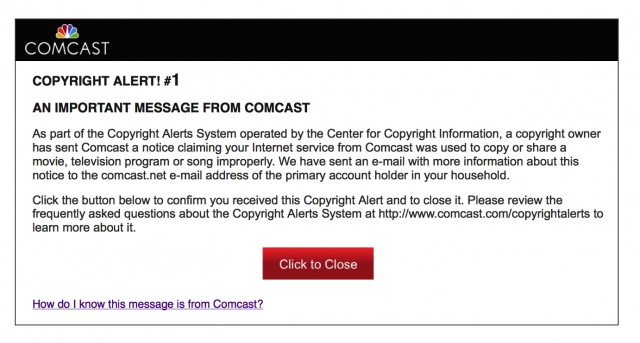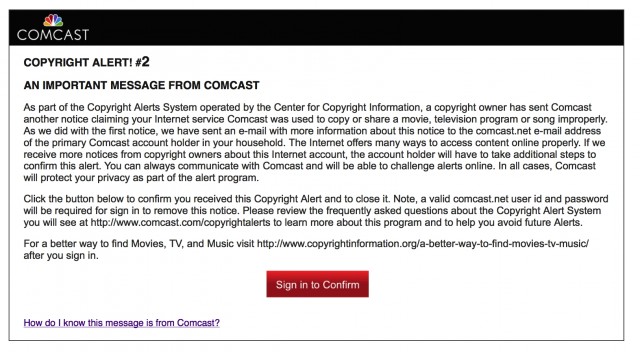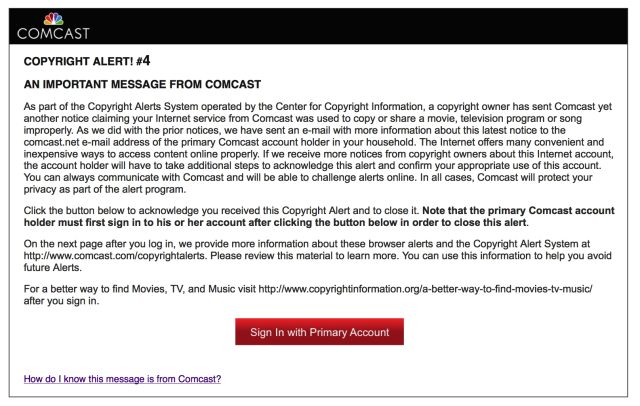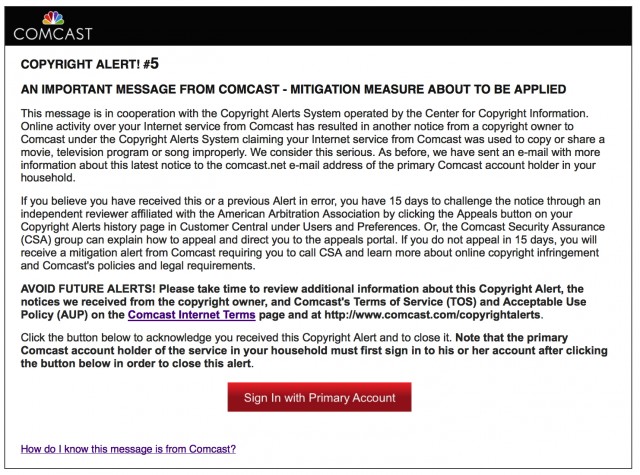Earlier this week, the Copyright Alert System (CAS)—better known as "six strikes"—finally debuted. Both Verizon and Comcast activated the service on Wednesday.
The new system is funded by a group known as the Center for Copyright Information (CCI), which is made up of five major American ISPs, the Motion Picture Association of America (MPAA), and the Recording Industry Association of America (RIAA). It's been in the works for years and may provide a significant change to the copyright infringement policing regime in the United States.
At the end of a series of six alerts, accused infringing customers could have their home Internet connection significantly slowed down. Those accused of infringing can file an appeal for $35. (Here's the CCI's new video explaining the process, as well as its new promo video.)
Both Verizon and Comcast updated their terms of service as of Wednesday, and each informed customers of their participation in six strikes on their websites. (But more than likely, most customers don’t spend much time checking out the corporate homepages of their ISPs.) Ars has reached out to all five of the participating ISPs—AT&T, Verizon, Cablevision, Time Warner Cable, and Comcast. Only the latter responded and agreed to provide copies of actual alerts. (Full disclosure: I am a Comcast customer.)
Charlie Douglas, a Comcast spokesperson, also told Ars that the company already sent out a “small number” of alerts despite this being the first day of Comcast's compliance. Douglas declined to disclose the actual number or the reason that number was being kept secret.
When Ars asked him to confirm that six strikes would not be able to see a potential violation if the user was using a VPN, he responded: “I think you’re right.”
Douglas did provide the language for alerts numbered one, two, four, and five. He has not yet responded concerning why Comcast is unable to provide the actual language for all six alerts or why he chose these particular ones to share with Ars. Comcast has also not shared any technical details of how it serves up an in-browser pop-up alert.
Numero uno
Here’s “Copyright Alert! #1”:

There are a few things we noticed after reading through these alerts.
The notice refers to a comcast.net e-mail address. Prior to updating some information on my own account earlier this month, I’ve never seen any messages sent to that account. I didn't even know that I had it. Apparently I’m not the only one.
“I will note, just as a single data point, that I'm sure that I personally have a comcast.net e-mail account and that I have no idea what it is,” Sherwin Siy told Ars. He’s the vice president of legal affairs at the advocacy group Public Knowledge and also a residential Comcast customer in Washington, DC.
“Were I to receive one of these notices, a lot of my time would likely be spent trying to figure that information out so I could know what I was actually being accused of,” he added.
Comcast’s Douglas also told Ars that all alerts were communicated via e-mail to users' comcast.net e-mail address and via an in-browser pop-up. That could suggest that if a Comcast user maintains a constant VPN connection and doesn't check their Comcast e-mail account, they could plausibly say that they never received any alerts.
The alert refers to a URL redirecting to a post titled "New Copyright Alert System."
“Six strikes is fundamentally flawed”
First, were a customer to receive this alert, she would get it out of the blue with no explanation about what it is. Second, the Center for Copyright Information’s (CCI) emphasized that the CAS is an education-based, rather than a penalty-based, system. But none of the alerts appear to provide any education about copyright or point users to legal alternatives.
“What is ‘improperly?' This is one of the problems with the system,” Derek Bambauer, a tech law professor at the University of Arizona, e-mailed Ars after he saw the alert pages.
“Making a fair use of a copyrighted work is not infringement. Thus, even if I download an entire copy, if it's fair use, I am not an infringer—and yet, the private law of six strikes treats me as one.”
Bambauer collaborated with Chris Soghoian, a policy analyst at the American Civil Liberties Union, to submit Freedom of Information Act requests to learn more about the creation of the six strikes program. The two have a pending legal case to compel the Obama Administration’s Office of Management and Budget to release more information and related documents.
“Six strikes is fundamentally flawed,” Bambauer added. “Part of the reason is that users were never at the table: the bargaining parties were content owners and ISPs. And ISPs have very limited incentives to defend free speech or protect against mistakes—especially if all of their major competitors are in the system, too. No way to vote against the system with your feet.”
We’ve included copies of alerts two and five below. Have you received any CAS alerts from your ISP yet? Please share in the comments.



Listing image by Alex Shamis
reader comments
209